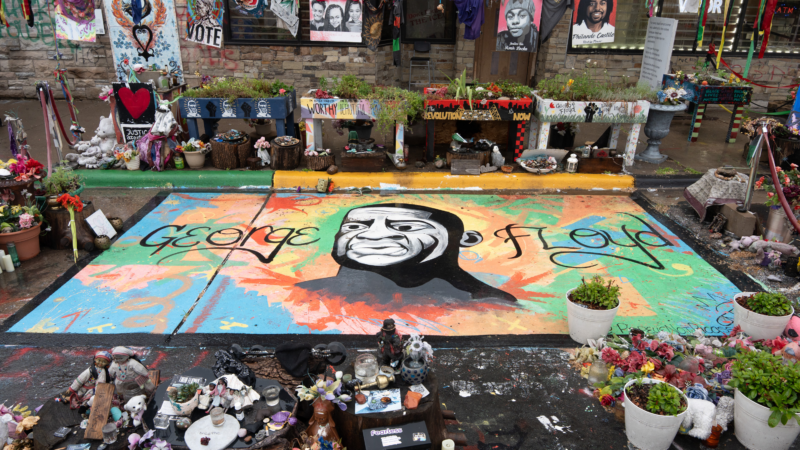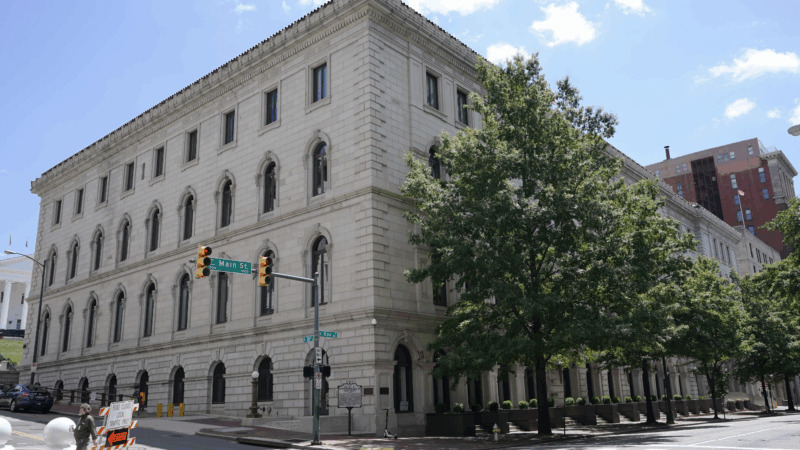The world witnessed George Floyd’s murder. 5 years later, what has changed?
By now we all know what happened. A Black man named George Floyd was accused of using a counterfeit $20 bill to buy cigarettes at a convenience store in Minneapolis. Police were called, and a white officer named Derek Chauvin killed Floyd by kneeling on his neck for nine and a half minutes while he was handcuffed face down in the street. Two other officers helped restrain Floyd. A fourth kept onlookers from intervening. All were eventually fired and sent to prison.
Days of protests against police violence ensued. Many were peaceful, some were not. One estimate found it was the first “civil disorder event” to result in more than $1 billion in losses.

Five years later, many of us are still trying to wrap our heads around why it happened, and just as importantly, what those tragic and frightening words and days mean to us now.
That’s why a group of us from Morning Edition spent the week in the Twin Cities, driving and walking around, listening and talking, asking people for their thoughts about what they think the events of May 2020 meant. We spoke with people from different backgrounds: ministers, activists, educators, a business owner who is still trying to make a living on the street where Floyd was killed and having a tough go of it.

We talked with officials like Mayor Jacob Frey and Minnesota Attorney General Keith Ellison. We spoke with the former police chief, Medaria Arradondo, known as Chief Rondo, who made the decision to pull his officers back from the Third Police Precinct and request the governor send in the National Guard as the protests became more violent. It’s a decision that remains controversial: critics say he let the protests get out of hand; he says property was lost but lives were saved.
We talked with attorney Benjamin Crump, a veteran of many police misconduct cases dating back years, who negotiated a large settlement for Floyd’s family in a civil action, and lawyer Antonio Romanucci, who represented one of the bystanders who begged the police to get off Floyd’s neck.

One thing that became clear to me – something that had not occurred to me before our visit – is that because of the cell phone video that a young teenager took, we are all witnesses, at least if we chose to look.
And that means all of us who chose to look have decisions to make about how we think about what happened here.
After Floyd’s death, there were lots of big gestures. Companies made donations. Governments made commitments. Some police departments reformed policies. Some states passed new laws. Lawsuits were filed. Settlements reached. But could this still happen again? It’s a question that doesn’t belong to just one city or town. It belongs, in one way or another, to all of us.

Annual governors’ gathering with White House unraveling after Trump excludes Democrats
An annual meeting of the nation's governors that has long served as a rare bipartisan gathering is unraveling after President Donald Trump excluded Democratic governors from White House events.
Federal judge acknowledges ‘abusive workplace’ in court order
The order did not identify the judge in question but two sources familiar with the process told NPR it is U.S. District Judge Lydia Kay Griggsby, a Biden appointee.
Top 5 takeaways from the House immigration oversight hearing
The hearing underscored how deeply divided Republicans and Democrats remain on top-level changes to immigration enforcement in the wake of the shootings of two U.S. citizens.
Snowboarder Chloe Kim is chasing an Olympic gold three-peat with a torn labrum
At 25, Chloe Kim could become the first halfpipe snowboarder to win three consecutive Olympic golds.
Pakistan-Afghanistan border closures paralyze trade along a key route
Trucks have been stuck at the closed border since October. Both countries are facing economic losses with no end in sight. The Taliban also banned all Pakistani pharmaceutical imports to Afghanistan.
Malinowski concedes to Mejia in Democratic House special primary in New Jersey
With the race still too close to call, former congressman Tom Malinowski conceded to challenger Analilia Mejia in a Democratic primary to replace the seat vacated by New Jersey Gov. Mikie Sherrill.





